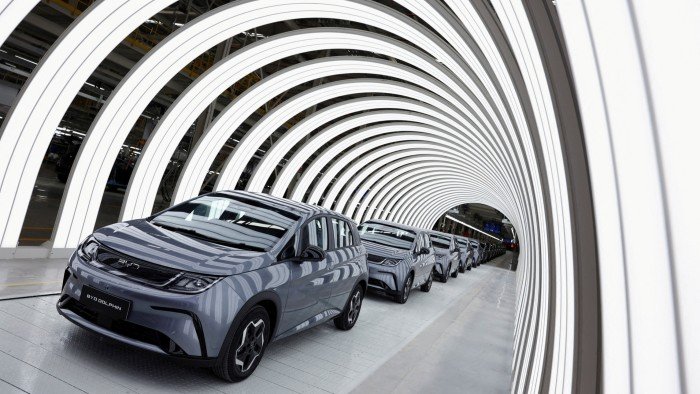Unlock the Editor’s Digest for free
Roula Khalaf, Editor of the FT, selects her favourite stories in this weekly newsletter.
There was a time when seatbelts in cars were optional. Airbags, too, were once considered a luxury, reserved for high-end models. Now, we wouldn’t think of driving without them.
Safety, once a premium feature, evolved into a necessity — an industry standard that automakers could no longer charge extra for. The same shift may be under way for self-driving technology, and one company is forcing the industry’s hand. BYD, the world’s largest electric vehicle maker, is making advanced driver assistance systems a standard feature across most of its line-up — at no additional cost.
For years, carmakers have looked to driver assistance software as the key to offsetting declining hardware margins. This held promise as a cash cow, much like tech companies monetise cloud services, a high-margin add-on that would generate billions in new revenue. Tesla, for example, charges $8,000 for its driver assistance software in the US as of April. Mercedes-Benz and GM are among many carmakers banking on monetising assisted driving technology.
There are inherent risks to self-driving software, from technology failures to potential cyber security threats. But unlike fully autonomous vehicles, which remain controversial and unproven at scale, advanced driver assistance systems — which enhance rather than replace human control — have already demonstrated their value.
Studies suggest that these systems, which include highway and traffic assist systems, automatic emergency braking and forward collision warnings, could significantly improve road safety. Research from the Insurance Institute for Highway Safety has shown that cars with these features can reduce rear-end collision involvement rates by up to 50 per cent. Wider adoption could reduce accident frequency by around a quarter, according to research in the UK, while the most common types of accidents would be reduced by 29 per cent with full deployment.
Assuming a conservative 30 per cent adoption rate and a $5,000 fee per vehicle, a carmaker selling 10mn cars annually could potentially generate $15bn in revenue a year from self-driving features alone. Some carmakers have introduced subscription models: Tesla, for example, charges $99 a month, which helps generate recurring revenue long after a car is sold. Scale that adoption further — as technology advances and consumer scepticism declines — and the financial potential becomes even more compelling. That explains why automakers have been so eager to monetise the technology. Safety sells. The question now is: can it still be sold?
BYD is making that question harder to answer. By including advanced driver assistance systems as standard across its line-up — even on its $9,500 Seagull EV — BYD is challenging the pricing strategy that rivals have relied on.
Automakers will find it increasingly difficult to justify charging for software in markets where BYD is offering it as standard. The longer-term consequences could be even more disruptive. If BYD’s move forces rivals to slash software prices — or abandon paid models entirely — the industry’s vision of AI-powered, high-margin profits may never fully materialise.
Not all markets will be affected equally. In the US, where tech rivalry with China is intensifying and BYD has little presence, restrictions on its driving software — justified on national security grounds — are likely. Such measures would effectively shield automakers’ software-driven sales in the US from immediate disruption.
But that would only delay the inevitable. BYD’s global expansion is already gaining momentum. In the UK, BYD outsold Tesla in January, with sales growing sixfold from the previous year, while Tesla’s fell 8 per cent. In Singapore, BYD has overtaken Toyota as the best-selling car brand in the city-state, a feat given this includes both EVs and petrol cars. In Brazil, the story is much the same with sales growing fourfold last year.
Now, with each new market it enters, BYD won’t just be selling more cars, it could start to redefine industry expectations. History suggests that once a technology becomes indispensable, the premium disappears. Power windows, anti-lock brakes, rear-view cameras — all were once luxury features that have become standard. Once consumers get used to something as standard, there is no turning back. Just like seatbelts.
june.yoon@ft.com
